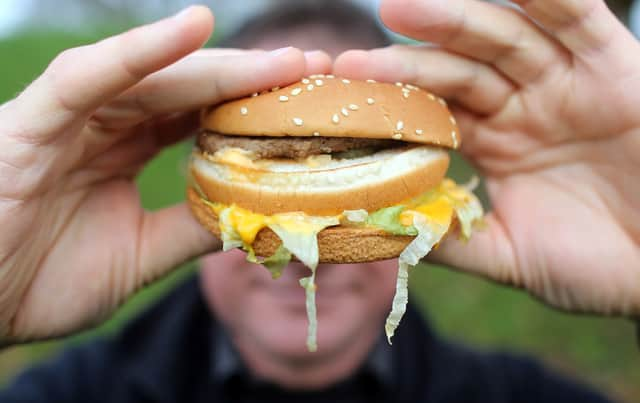Junk food ads to be banned online and before 9pm on TV in crackdown on obesity


Junk food adverts are to face tougher online restrictions and a ban on TV before 9pm from the end of next year, the government has announced.
The new measures will be some of the strictest marketing restrictions in the world and come as the Prime Minister aims to deliver on his pledge to address the UK’s growing obesity crisis.
Foods high in fat, sugar and salt to be banned
Advertisement
Hide AdAdvertisement
Hide AdThe restrictions will see fast food and confectionery giants banned from advertising products which are high in fat, sugar and salt (HFSS) online, although there will be exemptions for small businesses with 249 staff or less.
Companies will be able to continue promoting their products on their own websites and social media outlets under the new measures, with firms also able to advertise on TV before the 9pm watershed, providing they do not show banned foods.
However, online audio will be exempt from the restrictions, allowing fast food and confectionery to be advertised on radio stations broadcasting over the internet, as well as on podcasts.
The regulations also allow exemptions for the healthiest food items within each category, such as honey, olive oil, avocados and marmite.
Advertisement
Hide AdAdvertisement
Hide AdPublic health minister Jo Churchill said: “We are committed to improving the health of our children and tackling obesity. The content youngsters see can have an impact on the choices they make and habits they form.
“With children spending more time online, it is vital we act to protect them from unhealthy advertising.
“These measures form another key part of our strategy to get the nation fitter and healthier by giving them the chance to make more informed decisions when it comes to food.
“We need to take urgent action to level up health inequalities. This action on advertising will help to wipe billions off the national calorie count and give our children a fair chance of a healthy lifestyle.”
Rise in advertising blamed for obesity problem
Advertisement
Hide AdAdvertisement
Hide AdIncreased exposure to online junk food advertising has been blamed for the rise in childhood obesity, with research finding that youngsters under the age of 16 were exposed to an estimated 15 billion junk food adverts online in 2019.
This marks a huge increase from just 700 million adverts two years earlier.
Research also found that one in three children leaving primary school are now overweight or obese, as are almost two thirds of adults in England.
It is hoped that the new advertising measures will help encourage more people to adopt a healthier lifestyle and has won praise from the Obesity Health Alliance, which said the new policies show the government is serious about putting the health of the nation first.
Advertisement
Hide AdAdvertisement
Hide AdHowever, the Advertising Association has criticised the move saying it was “dismayed” by the ban, saying it will prevent many food and drink companies from being able to showcase new product innovations, while pubs and restaurants will be stopped from telling customers about their menus.
It will also be a huge blow to online publishers and broadcasters who face losing vital advertising revenue to fund jobs.
The plans have also come under fire by the Food and Drink Federation, which labelled the proposals as “headline-chasing policies”.
The Federation’s chief scientific officer, Kate Halliwell, said: “We are disappointed that the Government continues to press ahead with headline-chasing policies which will undermine existing government policies, principally the reformulation programmes to reduce calories, sugars and salt and portion sizes.
Advertisement
Hide AdAdvertisement
Hide Ad“The proposals would make it difficult to advertise many products that have been carefully reformulated or created in smaller portions in line with the government’s own targets; for example, Cadbury would not be able to advertise their 30 per cent reduced sugar Dairy Milk.
“Not only do the proposals signal a lack of joined-up policy, the implementation periods for both advertising and promotional restrictions do not give businesses enough time to prepare for the changes.”